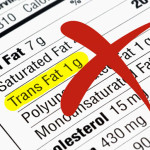Why the US is Banning Trans Fats and How Palm Oil Can Help
Palm oil has many benefits – environmental benefits, for its amazing yield, low land-use and productivity; social benefits, for employing small farmers, empowering rural communities, building infrastructure and reducing poverty across the developing world; and, of course, health benefits – for its content of Vitamins A and E, as well as a balanced composition of saturated and unsaturated fats.
Another primary health benefit of palm oil is that it is 100% free of trans fats – one of the most dangerous substances in food, according to the US Food and Drug Administration (FDA). On June 16, it announced its intention to ban the use of partially-hydrogenated vegetable oils – the source of industrial trans fats – in processed foods within three years.
Soft oils are partially hydrogenated in order to harden them to be used in food preparations. Palm oil’s unique balanced composition means it is naturally semi-solid and does not require hydrogenation.
The FDA’s decision offers the palm oil industry an immense opportunity to recoup lost ground in terms of both business and marketing. Many scandalous and untruthful campaigns against palm oil have been pursued in the US and Europe in recent years – often funded by domestic oilseed competitors – and this has harmed the image of palm oil in some markets.
The growing recognition of the need to remove trans fats will enable Western markets to see palm oil for what it really is: a safe, healthy alternative that can also lower food prices and help small farmers in the developing world.
Best safeguard
The FDA will surely not be the last regulator to consider taking this step. In Europe, an opportunity was missed with the EU Food Information to Consumers Regulation, which inexplicably gave trans fats an easy ride. However, Europeans are notoriously health-conscious and it is expected that the debate on banning trans fats will resurface.
A big part of the argument for removing trans fats is not just about regulation. Countries and industries must also promote safe alternatives. Palm oil producers will find allies in the scientific community, related businesses and among informed politicians to support this process. It is for the good of all – consumers, business and governments – that this most harmful substance is removed from food products.
The Malaysian palm oil community has always been a byword for high-quality, responsibly-produced palm oil. In addition to that accolade, we now have the opportunity to make a positive contribution to consumer health in markets across the world by highlighting that palm oil provides the best safeguard against trans fats.
Tan Sri Datuk Dr Yusof Basiron










Leave a Reply